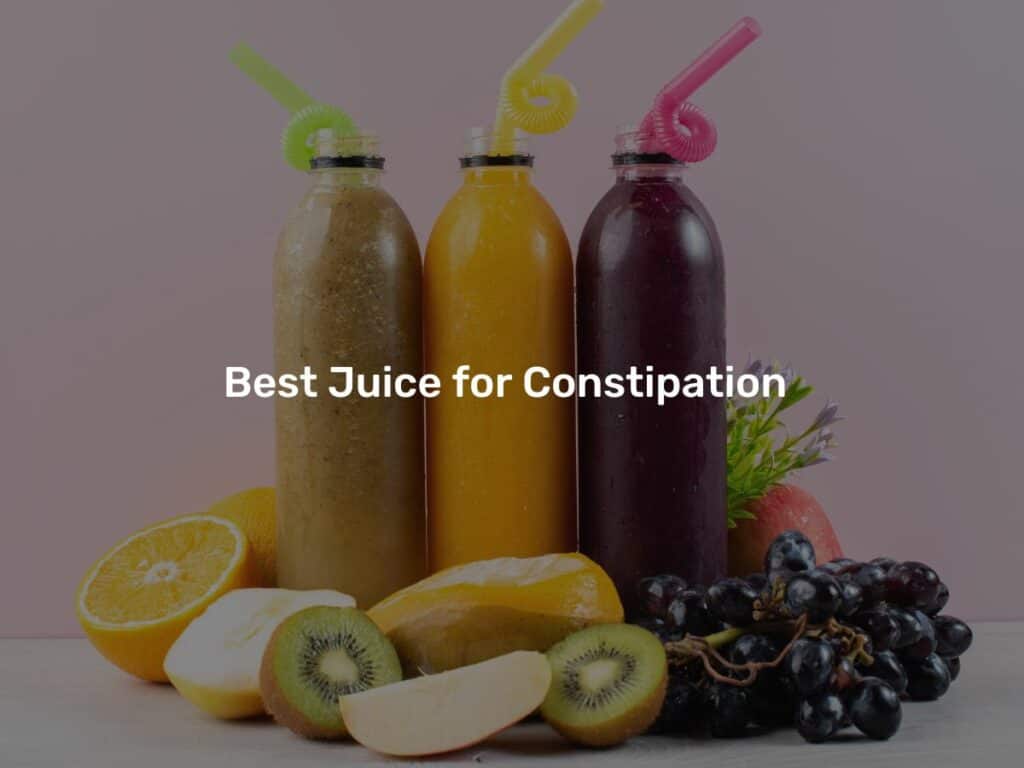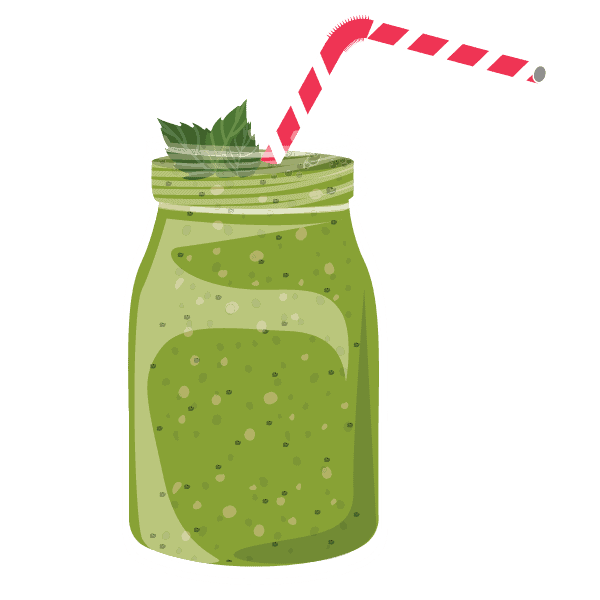Are you suffering from constipation? It’s a common problem that can affect anyone, causing discomfort and pain. Many often turn to juice for constipation relief, but certain juices are better than others.
Let’s jump in and explore the best juice for constipation. Whether you want to make fresh juice at home or store-bought juice – I’ll give you both options to help relieve your symptoms as quickly as possible.
Understanding Constipation and Its Causes
Constipation is a common digestive problem characterized by infrequent bowel movements and difficulty passing stool. It can be uncomfortable to discuss, but understanding what’s causing it is the first step toward relief. The underlying causes of constipation vary from person to person but often include dietary issues, pain relief medications, dehydration, or lack of physical activity.
Sometimes chronic illnesses such as diabetes or multiple sclerosis may cause constipation too. And if you’re pregnant and constipated, I feel you. This happened to me with both of my pregnancies!
If you’re experiencing constipation for more than two weeks, contact your doctor for further advice. He or she may prescribe medication to help relieve your symptoms. Making lifestyle changes like increasing fiber intake in your diet and drinking plenty of fluids are essential steps to take when dealing with this condition.
What is the Best Juice For Constipation?
Here are four of the best juices for constipation relief:
- Prune juice – Prunes contain sorbitol, which acts as a natural laxative. Drinking prune juice or eating dried prunes will add fiber to your diet while providing relief from constipation.
- Apple Juice – Apples contain pectin, a soluble form of fiber that helps soften stools and clear bowel movements. Adding apple juice to your diet can be beneficial for combating constipation.
- Pear Juice – Pears also have high levels of dietary fiber, specifically pectin, which promotes healthy digestion and reduces symptoms associated with constipation.
- Plum Juice – Prunes are dried plums, but if you have fresh plums on hand you could try making a juice from these. The natural sugars like sorbitol, and phenolic compounds help improve digestion and promote bowel movements.
Finding the right balance between hydration, exercise, and consuming foods rich in fiber along with one or two glasses of constipation-relieving juice per day will ensure optimal digestion and fewer episodes of uncomfortableness linked to this condition.
Prune Juice
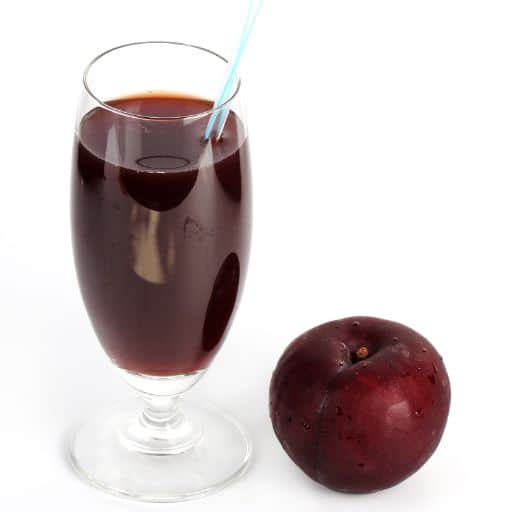
Prune juice offers a range of benefits for those suffering from constipation. Firstly, it is high in fiber, which helps to regulate digestion and relieves bloating and discomfort associated with backed-up bowels. Prunes contain natural laxatives that help stimulate the body’s bowel movements and promote regularity.
These prune juice benefits make it an ideal choice for those seeking relief from their constipation. It has been found to improve overall gastrointestinal function, helping reduce strain during bathroom visits and eliminating any accompanying stomach pains or cramps. In addition, studies have shown that drinking prune juice may even provide long-term protection against future bouts of constipation if consumed regularly over time.
For these reasons, many people find that incorporating prune juice into their diet effectively manages their constipation. Prune juice provides quick relief when needed but is also a daily preventative measure. Its mild sweetness makes it incredibly palatable, so anyone can enjoy its powerful effects on digestive health quickly and conveniently anytime they need them most.
I recommend Sunsweet no added sugar prune juice, which you can buy on Amazon.
Apple Juice
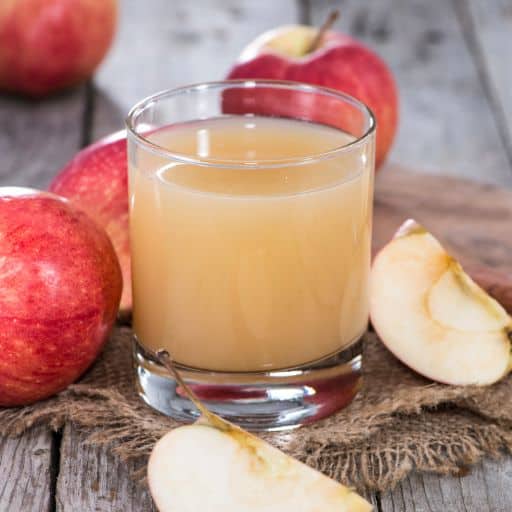
Apple juice may be an effective remedy to help with constipation. Apple juice is a natural laxative that can relieve the discomfort associated with constipation. It contains pectin, which helps promote digestive health by binding to water molecules in the intestines and creating bulk, aiding digestion and preventing the hardening of stools.
Additionally, apple juice has malic acid, which stimulates peristaltic motion – the movement of food through the intestine – and other components like vitamins A, B-complex, C, and E that aid the proper functioning of the intestinal system.
Apple juice also acts as an antacid due to its low pH level and helps reduce inflammation caused by indigestion or gas. This drink is full of essential minerals such as calcium, magnesium, and potassium that are important for healthy digestion; plus, it supplies antioxidants needed for detoxification processes within the gut lining. These combined properties make apple juice an ideal solution for naturally relieving constipation without side effects.
Stick with the sweeter apples that are likely to have more natural sugars to stimulate your gut motility. My article on the best apples for juicing can help you choose.
Pear Juice
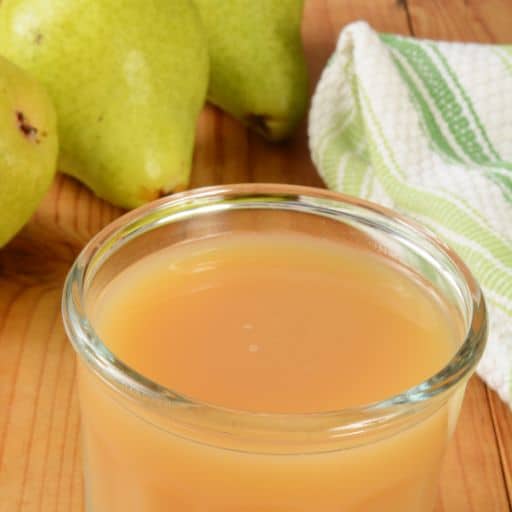
Like apples, pears have long been used as natural remedies to help relieve constipation. Pear juice helps soften stools while stimulating the intestines for better digestion.
Pear juice can be consumed on its own or combined with other juices such as apple juice or prune juice for an even more powerful remedy. Drinking 8 ounces of pear juice twice daily has proven to be very successful at relieving constipation within 48 hours.
Due to its effectiveness, using pear juice as a natural remedy for constipation is becoming increasingly popular. Its ease of use and the quick result makes it an ideal choice for anyone looking for a safe yet reliable way to alleviate their gastrointestinal issues.
Whether enjoyed alone or mixed with another type of juice, drinking pear juice regularly can help with constipation. Ideally, juice your own pears when they are in season, otherwise you can buy no added sugar, organic pear juice on Amazon. I recommend Georgia’s Natural Organic Pear Juice:
Plum Juice
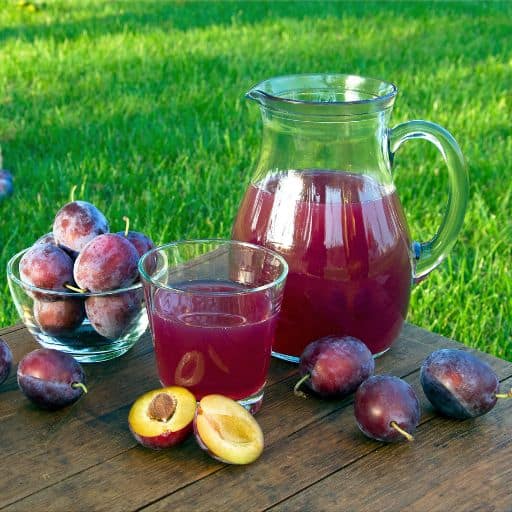
Did you know that prunes are dried plums? Plums, known for their sweet and succulent flavor, offer more than a delightful taste. In addition to being an excellent snack or ingredient in recipes, plums may also relieve constipation due to their high dietary fiber and sorbitol content.
If plums are in season, why not try juicing fresh plums rather than making or buying prune juice?
Plums contain natural sugars like sorbitol, and phenolic compounds that can help improve digestion and promote bowel movements.
Other Juices With Benefits for Digestive Health

Celery Juice
Celery juice has been touted as a natural remedy for digestive issues such as constipation, bloating, and indigestion. It is packed with vitamins and minerals that aid in digestion.
| Benefits of Celery Juice | Digestive Benefits | Other Health Benefits |
|---|---|---|
| Reduces inflammation | Relieves constipation | Strengthens immune system |
| Improves hydration | Stabilizes pH levels | Controls blood pressure |
| Detoxifies body | Improves gut health | Reduces joint pain |
While there are many benefits of celery juice on overall health, its most notable effects on digestive health cannot be overlooked. It not only relieves common problems like constipation but also works to improve gut health by balancing pH levels and reducing inflammation in the gastrointestinal tract.
This can help reduce symptoms associated with irritable bowel syndrome (IBS) or other digestive disorders. This nutritious beverage may even help control blood pressure due to its potassium content.
Celery juice offers numerous advantages when it comes to both general health and digestive well-being. From hydrating the body to providing essential nutrients, from boosting immunity to fighting inflammation – this drink packs a lot into every sip! Whether you’re dealing with occasional tummy troubles or chronic GI conditions, adding celery juice to your diet could be a helpful solution in improving overall digestive health.
Learn how to make celery juice at home in my article, which has instructions for using either a juicer or a blender.
Pineapple Juice
Pineapple contains a unique enzyme called bromelain that can help break down proteins in the intestines and stimulate digestion. This helps reduce bloating and makes food passing through your system easier.
Although these properties make pineapple juice an effective remedy for constipation, there are some potential drawbacks. For example, if you suffer from irritable bowel syndrome (IBS), consuming large amounts of pineapple could aggravate symptoms due to its high acidity levels.
It’s also important to note that fresh fruit juices are not as rich in fiber as eating whole fruits or vegetables – so they may not provide long-lasting relief.
In summary, drinking pineapple juice has benefits when dealing with occasional constipation; however, always check with a medical professional beforehand and keep consumption moderate since too much can cause gastrointestinal distress.
Aloe Vera Juice
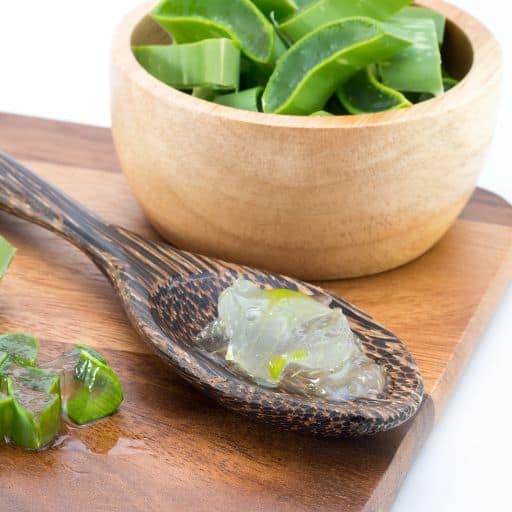
Aloe vera juice is believed to help with constipation because of its natural laxative properties. I encourage you to read my article about aloe vera juice and the potential toxicity of consuming the plant, and risks associated with making aloe vera juice at home.
If you want to try aloe vera, I suggest buying a commercially prepared bottle such as Lily of the Desert Organic Aloe Vera Juice, which you can buy here on Amazon.
Drinking aloe vera juice regularly is thought to have several benefits, including:
- Reducing inflammation in the intestines;
- Softens stools;
- Aloe vera contains compounds like mannose and glucomannan, act as prebiotics to promote healthy bacteria growth in the gut microbiome aiding overall digestion.
It is important to note that using aloe vera juice for constipation should be done with care. Excessive consumption of aloe vera juice can cause diarrhea, abdominal cramps and electrolyte imbalances. Some people may be allergic to aloe vera as well.
Orange Juice
Orange juice is often recommended to those suffering from digestive issues due to its high vitamin C content.
| Benefits | Drawbacks |
|---|---|
| High Vitamin C Content | High in Sugar & Calories |
| Natural Laxative Properties | Acidic Taste |
| Abundant Health Benefits | Increased Blood Glucose Levels |
| Rich Nutrient Profile |
Freshly squeezed orange juice can provide some benefits for digestion and may help with constipation for some people. Oranges contain a good amount of dietary fiber, particularly in the pulp, which can help add bulk to the stool and make it easier to pass. Additionally, oranges are a source of natural sugars, like fructose, which may have a mild laxative effect for some individuals.
However, it’s important to note that when oranges are juiced, much of the fiber is removed, and the juice will have a lower fiber content compared to eating a whole orange. Therefore, freshly squeezed orange juice may not be as effective in relieving constipation as consuming whole oranges with their pulp.
Constipation in Babies, Infants and Toddlers

For infants and toddlers with occasional constipation, pear or prune juice works well, as it has a mild laxative effect on their systems. Start with a maximum of 1oz per day and consult with your pediatrician as soon as possible.
Please note, serving juice is not recommended to infants under 12 months of age. Babies under 6 months old should be given breast milk or forumla only.
If constipation continues in children, please consult a pediatrician. Functional constipation is a medical disorder and requires treatment by a doctor.
When Is The Best Time To Drink Juice for Constipation?
If you’re constipated and have juice on hand, drink it. There really is no best time, however, here are some suggestions:
- In the morning: Drinking prune juice in the morning on an empty stomach may help stimulate bowel movements, as your digestive system has been resting overnight and may be more responsive to the natural laxative properties of prune juice.
- Before bedtime: Drinking prune juice before bedtime can allow it to work overnight and potentially result in a bowel movement in the morning.
- Spread throughout the day: Drinking smaller amounts of prune juice throughout the day may help maintain a consistent level of its laxative effects, which could be helpful for some individuals.
It is essential to start with a small amount of prune juice and monitor your body’s response. Gradually increase the quantity if needed, but avoid consuming excessive amounts, as it may lead to diarrhea or gas.
Potential Side Effects Of Drinking Juice for Constipation
When it comes to relieving constipation, reaching for prune juice may seem like an easy solution. Given the best juices for constipation all have a high sugar content, talk to your doctor about how long you should drink these for.
The potential side effects of long term high sugar juice consumption are as bad as drinking soda. Weight gain, dental carries, and blood sugar problems could be worse than constipation itself. Limit high sugar juice consumption to a maximum of 8 ounces per day.
Some fruits that naturally contain sugar alcohols, such as sorbitol or lactulose, can cause gastrointestinal upset. Symptoms include increased gas, bloating, or diarrhea.
Other Ways to Relieve Constipation
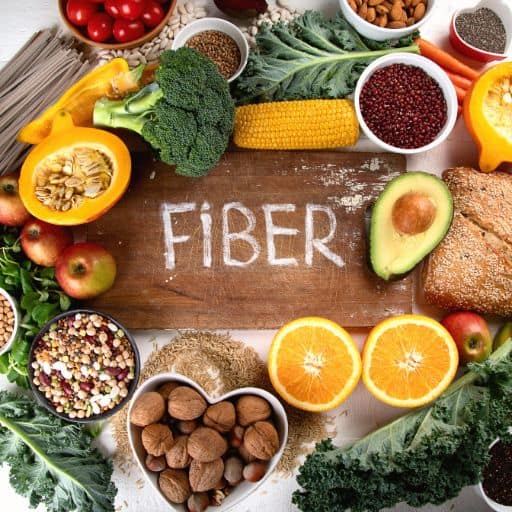
Juices might provide temporary relief from constipation symptoms, other food and beverage choices should definitely be considered too. Remember, prevention is better than cure.
The Dietary Guidelines for Americans suggests consuming 25-38 grams of fiber per day. Foods such as whole grains and legumes contain high amounts of dietary fiber which could prove beneficial in promoting regularity in the body. Eating whole fruits provides you with more fiber than juicing.
Here are some other ideas:
- Increase water intake – Drinking more water can help soften stools and make them easier to pass.
- Incorporate fiber-rich foods into your diet – Foods like beans, avocados, nuts and seeds all have high levels of dietary fiber which helps with digestion.
- Exercise regularly – Physical activity can help stimulate bowel movements and get things moving through the digestive system more quickly.
- Try laxatives or stool softeners– If other methods are not working, these medications may be used as they help move waste out of the body in cases of severe constipation.
Consulting with a doctor or nutritionist is recommended to discuss your individual needs.
Conclusion
Using juice to treat constipation can be a helpful remedy. It is important to remember that not all juices will have the same results; some work better than others for certain people. Therefore, experimenting with different types is a good idea until you find one that works best for you. Additionally, other foods and drinks may help relieve constipation if juices don’t seem like they’re cutting it—try adding more fiber-rich fruits and vegetables into your diet.

